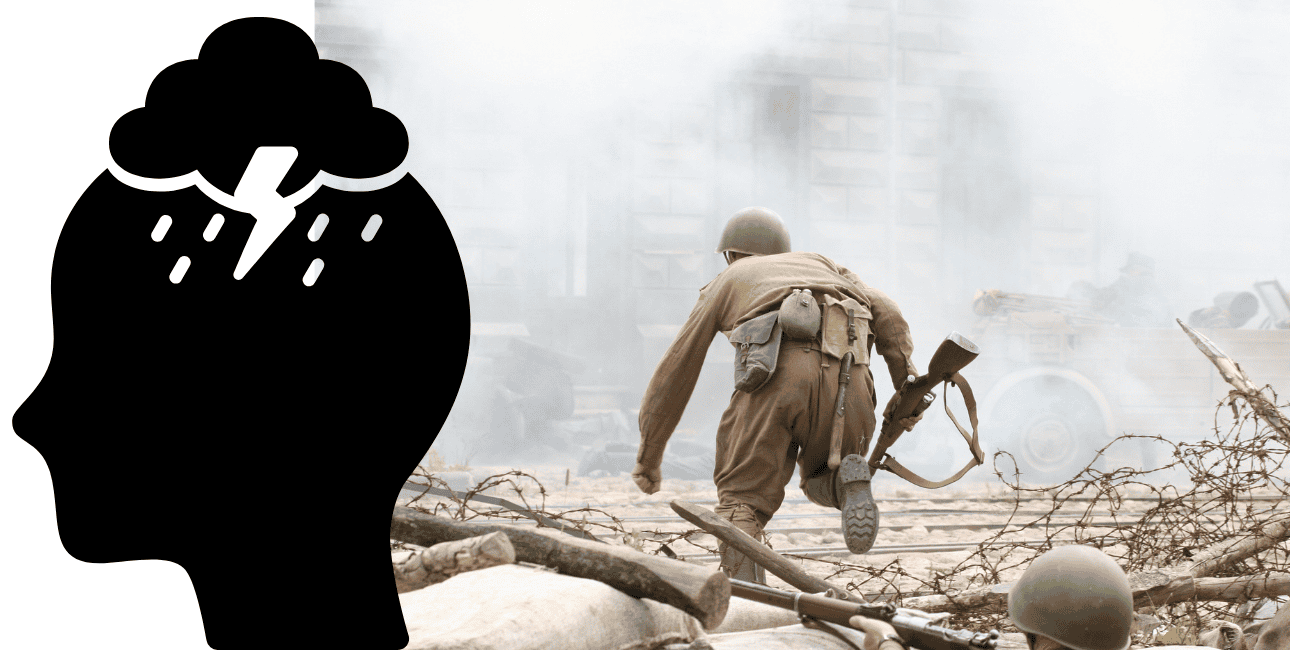If the peace talks between Ukraine and Russia succeed, millions of war veterans will return back to their societies. Many of them might have lost their comrades. Thousands of soldiers have been injured. Many face life-long disabilities. Thousands of Prisoners of War (POWs) will also be exchanged who have spent months and years in captivity.
As these millions of combat-hardened soldiers return to their homes, another battle awaits them—one that could be significantly more lonely and depressing.
Audie Murphy, America’s most decorated World War II Hero, has shed light on the hidden traumas of war.
In his 1955 autobiographical film “To Hell and Back,” where he played himself, Murphy shared his personal struggles, later recognized as Post-Traumatic Stress Disorder (PTSD). Haunted by nightmares, he always slept with a gun under his pillow and was addicted to sleeping pills.
I Lost My Mind To The War You Won
That’s how soldiers summarize the after-effects of the war on their lives.
A three-hour movie filled with violence, blood, and death can leave us sleepless and haunted. Imagine the lifelong trauma of a war survivor, reliving those horrors in reality.
They are haunted by those Phantom Flashbacks (vivid, disturbing memories of war). A 2007 study by The Institute of Medicine & National Research Council found that individuals struggling to overcome trauma often have pre-existing psychological vulnerabilities, such as Genetic Predispositions or Childhood Trauma or Abuse. These factors increase the likelihood of long-term trauma struggles.
Post Traumatic Stress Disorder (PTSD)
During the World Wars, it was called “shell shock,” “war nerves,” “neurasthenia,” or “combat neurosis.”
Around the 1970s, based on the experiences of Vietnam War Veterans, the term “Post-Traumatic Stress Disorder” was coined. PTSD is like living a dual life – one in the past and one in the present. Imagine an invisible dog clutching onto your clothes, not allowing you to move forward.

Traumatic events alter brain chemistry and structure, leading to PTSD. This condition is characterized by an abnormal stress response, imbalanced neurotransmitters, and altered brain regions.
A PTSD diagnosis indicates that a person has experienced a traumatic event involving violence or serious injuries or witnessing the deaths of near-ones, causing lasting emotional trauma.
Anxiety, Depression, Sleeplessness, Panic Attacks, Flashbacks, and Nightmares are very common symptoms. Diagnosing PTSD can be challenging because symptoms can overlap/co-occur with other mental disorders. It can also increase the risk of developing Violent Behaviour, Substance Abuse, Eating Disorders etc. The potential for over-reporting (for benefits or leniency, etc) or under-reporting is also a barrier.
Complex Post-Traumatic Stress Disorder (C-PTSD) is a condition that arises from prolonged and repeated traumatic experiences, like being taken as a Prisoner of War (POW).
Post-Combat Withdrawal Symptoms (PCWS)
Their families are very happy to have them back, blessed that they have returned safely. However, the real war begins at home once everybody settles down. The family members see the changes and try to understand them, which affects family dynamics.
The stark contrast between the adrenaline-fueled environment of war and the mundane routine of daily life can be overwhelming. They need to remember that they are not in the war zone. A wife doesn’t need a commander at home; she needs a husband.
Unfortunately, the monotonous chores at home might look disinteresting and unworthy of their stature – a war hero. Research shows a strong link between war and higher divorce rates. Additionally, studies indicate that active combat or frontline deployment further increases the likelihood of marital discord. It could be due to emotional numbing, communication breakdown, lack of intimacy, trust problems, etc.
Post-Combat Withdrawal Symptoms (PCWS) can explain the physical, emotional, and psychological challenges experienced by military personnel re-entering civilian life.
Treatment
Psychotherapy can help people regain control over their lives. Therapies like Cognitive Behaviour Therapy, Exposure Therapy, Mindfulness-Based Exposure Therapy (MBET), etc., can aid in processing traumatic experiences and rebuilding their lives. Psychotherapists help individuals gain clarity and insight into their experiences, emotions, and thoughts, much like holding up a mirror to reflect their inner world of turmoil.
Psychiatrists can prescribe medications for severe depression, anxiety, and sleep disorders. (Antidepressants, Anti-Anxiety medicines, Sleep medications, etc). Holistic approaches like Yoga, Acupuncture and Acupressure, Pet Therapy, Sports, Art, and Music Therapy, and joining community groups for support and social activities can be explored.
What they truly need is time to recover and heal, unconditional love and support to build trust, and a sense of reconnection to family and society. Eventually, meaningful employment or engagement will provide them with a sense of purpose and financial incentives.
Support Structure
The United States, the United Kingdom, Canada, and India provide various benefits and support services to veterans with PTSD. The US offers tax-free cash payments and other rehabilitation schemes. In the UK, charities like The Royal British Legion and Help for Heroes aid veterans in transitioning to civilian life.
Canada’s Veterans Affairs also provides comprehensive support, including rehabilitation, financial benefits, etc. The Indian government offers healthcare, financial assistance, rehabilitation, employment, and welfare services through schemes like the Ex-Servicemen Contributory Health Scheme (ECHS).
Cutting The Umbilical Cord
A war veteran is pulled over for speeding. In another corner of the world, a combat hero who has bravely served in a war is pulled up for rude talk to his neighbor. Both of them are back on ground reality. But they find it tough to accept that they are normal citizens now. They need to cut the umbilical cord from the past and move ahead in life for a successful transition.
Survivor’s Guilt
Survivor’s guilt is another mental condition that occurs when a person perceives himself as having survived a traumatic event while others could not. This can lead to feelings of Guilt and Shame. In Mahabharata, Yudhishthira is consumed by grief and guilt over the loss of life and the destruction caused by the war.
From ‘The Deer Hunter’ (1978) to ‘Thank You for Your Service’ (2017), numerous films have addressed the struggles of veterans with Survivor’s Guilt, shedding light on their experiences and promoting awareness.
War changes everyone – those who witness it and those who fight it. Exposure to bloodshed, killings, and violence alters your brain and personality. You’re not the same person when you re-enter society and family life. The experiences you’ve had, the traumas you’ve faced, have reshaped you.
As the Russian-Ukrainian war and the Israel-Palestine conflict continues, let’s pause and take a moment to think about the plight of those soldiers fighting these battles for us. What happens when the war ends? They will be left alone to cope with the devastation and bloodshed they have witnessed.
What will fade first: the shine on their medals or the traumas that will haunt them?
- Sunila Wali is a counseling psychologist with a passion for promoting mental health. She holds a Master’s degree from Johns Hopkins University and is currently based in Mumbai, India.
- Mail the author at sticku (at) jhu.edu
- Follow EurAsian Times on Google News




